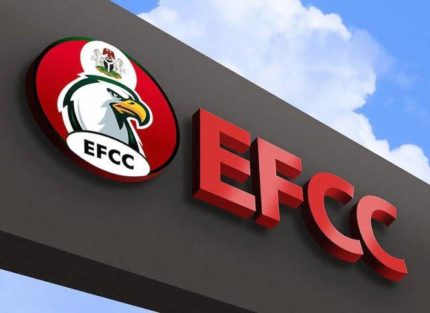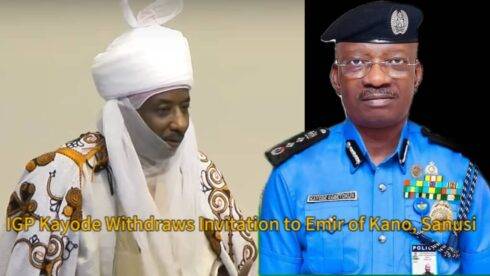The Economic and Financial Crimes Commission (EFCC) has been embroiled in numerous controversies, revealing a pattern of unprofessional conduct by its operatives. The recent raid at a Lagos hotel on June 27th, 2024, is a glaring example. In a viral video, EFCC agents were seen forcefully entering a room, ransacking it, and manhandling a female hotel staff member. This incident has amplified public outrage and raised serious questions about the agency’s operational methods.
The Lagos hotel raid is not an isolated event. The EFCC has faced criticism for similar heavy-handed tactics and procedural lapses in the past. On November 1st, 2023, the Economic and Financial Crimes Commission conducted a night raid at Obafemi Awolowo University in Ile Ife, arresting over 70 students on suspicion of internet fraud. The late-night operation and mass arrests drew accusations of racial profiling and procedural misconduct. Although 58 students were eventually released and further night raids were banned, the incident tarnished the EFCC’s reputation and credibility.
Growing Public Outrage and Demand for Overhaul
Public dissatisfaction with the EFCC has been mounting, with many Nigerians calling for a comprehensive overhaul of the agency. The June 9th, 2024, raid in Akure, where 127 individuals were arrested on suspicion of internet fraud, further fueled these demands. The operation was met with protests and allegations of wrongful arrests and a lack of due process. Youths demanded the release of those detained, underscoring the growing mistrust in the EFCC’s methods and intentions.
The outcry following the Lagos hotel incident has intensified calls for reform. Critics argue that the EFCC must align its operations with its core mandate and operate within the bounds of the law. The public’s patience is wearing thin, and there is a palpable sense of urgency for the agency to address its internal issues. Analysts warn that failure to reform could lead to widespread civil unrest, similar to the #EndSARS protests that arose from police brutality concerns.
EFCC Response and the Need for Reform
In response to the Lagos hotel incident, EFCC Chairman Ola Olukayode ordered the arrest of the two officers involved and promised a thorough investigation. “The Executive Chairman of the Economic and Financial Crimes Commission, EFCC, Mr. Ola Olukayode, has ordered the arrest of two officers of the commission allegedly involved in the manhandling of a female staff of the Regional Hotel, Ojo, Lagos,” stated Dele Oyewole, the EFCC spokesperson. Olukayode assured the public that the EFCC would continue to operate professionally and with respect for the rule of law.
Despite these assurances, skepticism remains high among Nigerians. Analysts emphasize the need for the EFCC to take concrete steps to root out corrupt or unscrupulous elements within its ranks. They point to the disbanded Special Anti-Robbery Squad (SARS) as a cautionary tale, highlighting how ignoring public concerns about police brutality led to the #EndSARS protests. “Before Nigerians demand enough is enough from EFCC, the agency must learn from the sad ending of the SARS,” argued Ismail Alabi. For the EFCC to restore public trust, a genuine commitment to reform and accountability is essential.
Rebuilding Trust and Following Due Process
The Economic and Financial Crimes Commission (EFCC), as outlined on its website, upholds values such as integrity and professionalism in its mission to combat economic and financial crimes. However, recent operations have sparked criticism for deviating from these principles. Critics highlight instances of wrongful profiling, arbitrary property confiscations, and unlawful arrests, which undermine public confidence and threaten economic stability.
Lawyers and human rights advocates, including prominent figures like Deji Adewale, assert that restoring the EFCC’s integrity is imperative to prevent further erosion of trust. They stress the urgency of holding the agency accountable and ensuring transparency across all government institutions. Adewale emphasizes that adherence to due process is not only a legal necessity but also fundamental to safeguarding civil liberties and fostering a conducive environment for economic activities.
Moving Forward
To regain public trust, the EFCC must embark on a path of reform and accountability. Analysts recommend initiating a thorough investigation into recent controversial operations, such as the Lagos hotel raid, and implementing disciplinary actions where necessary. This step is crucial in demonstrating the agency’s commitment to upholding the rule of law and correcting any missteps.
Moreover, stakeholders advocate for a comprehensive review of EFCC’s operational strategies to align them with due process standards and eliminate any forms of discriminatory practices. Enhancing communication with the public is equally essential; providing clear justifications for raids and arrests, along with transparent reporting of outcomes, will foster greater understanding and trust among citizens.
By reaffirming its core values and adhering strictly to legal protocols, the Economic and Financial Crimes Commission can effectively fulfill its mandate of combating economic and financial crimes while restoring public confidence and advancing Nigeria’s economic integrity.
Table of Contents
Discover more from OGM News NG
Subscribe to get the latest posts sent to your email.














